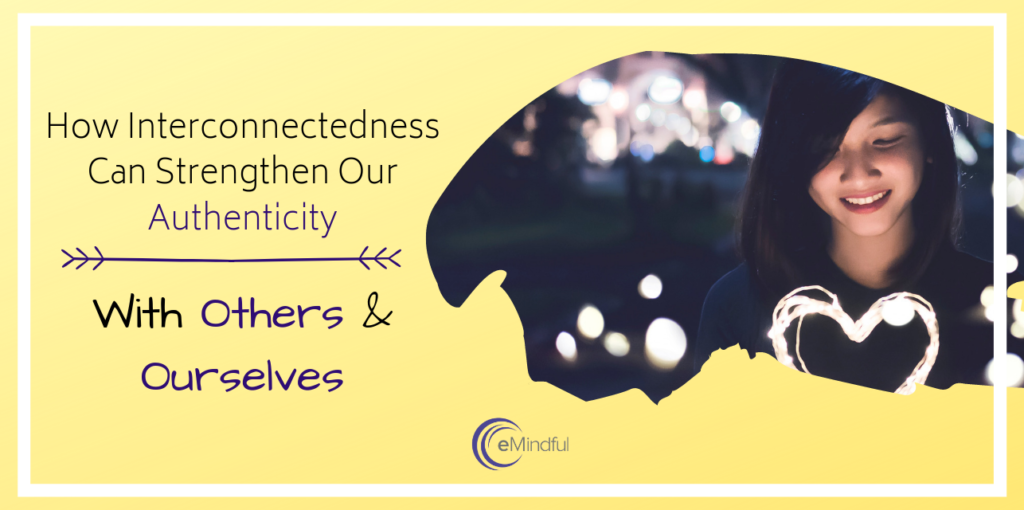
June 24, 2019
Interconnectedness: How it Can Strengthen our Authenticity with Others And Ourselves
In the early summer of 2018, I attended my first 5 Rhythms Dance class, a type of dance that’s intended to facilitate deep connection and creativity with what appears to be freestyle movement.
In spite of my lack of dance experience, I decided to give it a try after a friend told me how much she loved it.
As I watched people get out of their cars while I sat in the parking lot outside the studio, I began to question if I belonged there.
Am I too old?
Am I too motherly?
Am I too practical?
Am I too inflexible?
In essence, I’d made up my mind that I had no business being there before I even stepped foot on the dance floor. After some debating, I mustered up the courage to go in, shyly situating myself on a chair in the back of the room.
As I looked around, my eyes immediately fell on a group of people in the center of the room who moved and stretched expressively and without inhibition. You can still leave, I muttered to myself.
But, I eventually stopped fixating on what everyone else was doing, and reminded myself that I came here to dance.
I stood up, closed my eyes, and slowly began to move in unison with the music. It felt both completely foreign – and oddly familiar – to let the beat, rather than my thoughts, dictate my moment-to-moment movements.
In spite of my hesitance at the first class, and my continued uncertainty about whether I belonged, I came back week after week to explore the practice more in depth.
At around my 10th class, as I watched people congregate in the center of the room, carelessly shimmying and shaking their bodies, I felt this immense knowing that we’re more similar than different.
As I reflected on this after class, it grew clearer than before that in spite of our perceived – or real – differences, many aspects of our humanity are shared and universal.

Interconnectedness Meaning: What Is Interconnectedness?
Interconnectedness simply means our state of being connected with one another. Think about it, at our very basic level, we’re all very similar.
We all have bodies, hearts and minds.
We all experience joy – and pain.
We all long for truth and intimacy.
We all sometimes fumble our way through transitions and challenges.
And on a primal level, we are wired to depend on and seek out relationships with each other. In their book, Attached, Dr. Levine and Rachel Heller, point out that an individual’s capacity for self-regulation and resilience, for example, is dramatically influenced by whether there’s someone beside you who you know you can count on. In Western culture, such dependency can be perceived as weakness, but you can’t override your biology:
You have a deep need for safe, loving relationships.
You have a deep need to belong.

3 Simple Steps You Can Take to Strengthen Interconnectedness
The nice thing is, you can realize your full potential for interconnection without losing autonomy or power. Try these three easy steps to strengthen your own interconnectedness.
-
Develop a Relationship with Yourself
Even though it may sound paradoxical, one way to strengthen your own interconnectedness is to develop a closer, more understanding relationship with yourself.
In her book, Braving the Wilderness, Brene Brown posits that your ability to openly connect with others is informed to a large degree by your ability to connect with yourself.
“Our sense of belonging,” she says, “can never be greater than our level of self-acceptance.”
Mindfulness practice can help you deepen self-acceptance, as you learn to be lovingly present with your aches and pains, as well as your joy.
Meeting yourself with respect and understanding when you don’t feel up to par, or when you’re unclear about how to proceed with a decision. It’s all part of being human, and the more comfortable you are allowing your real experiences, no matter how annoying they may seem, the more comfortable you’ll be revealing your true self in relationship, showing up without sacrificing who you are.
-
Identify the Blocks in Your Relationships
Another mindfulness practice that can help foster more interconnection is to notice your patterns in relationship. Do you shy away from closeness? Do you disconnect or turn away when things get challenging? Do you lose yourself in relationship? Do parts of your past inform the way you orient yourself in relationship? Begin to develop more self-understanding and self-compassion for your relationship tendencies.
-
Take Time for Appreciation
Finally, make a point to slow down and appreciate others, both those you know and don’t, for the ways in which you’re similar. Focus on your shared aspiration for happiness, your wish to not suffer, your longing to give and receive love, your hope for deep safety in relationship.
Stretch yourself to look below the surface of roles, affiliations, appearance, and opinions, and, at least on occasion, plug into the deeper story of who we all are and how we’re all connected.
I hope you’ll join me and the thousands of others who are committed to the path and practice of mindfulness, and realizing – and multiplying – our strengths through interconnectedness.
About the Author
Breon Michel, MAPP, is a MBSR teacher in Phoenix, AZ. Also a mother of two, her mission is to support parents who are doing the hard, uncertain work of raising children in modern times. Providing families with tools to feel more connected, balanced and peaceful while creating an environment for children to thrive, in both the short- and long-term. Breon writes about various mindful parenting topics on her blog page & on Instagram, @breon.michel.